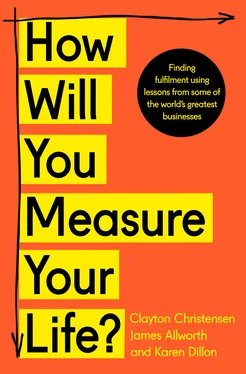The second realization I had is that the pursuit of money can, at best, mitigate the frustrations in your career—yet the siren song of riches has confused and confounded some of the best in our society. In order to really find happiness, you need to continue looking for opportunities that you believe are meaningful, in which you will be able to learn new things, to succeed, and be given more and more responsibility to shoulder. There’s an old saying: find a job that you love and you’ll never work a day in your life. People who truly love what they do and who think their work is meaningful have a distinct advantage when they arrive at work every day. They throw their best effort into their jobs, and it makes them very good at what they do.
This, in turn, can mean they get paid well; careers that are filled with motivators are often correlated with financial rewards. But sometimes the reverse is true, too—financial rewards can be present without the motivators. In my assessment, it is frightfully easy for us to lose our sense of the difference between what brings money and what causes happiness. You must be careful not to confuse correlation with causality in assessing the happiness we can find in different jobs.
Thankfully, however, these motivators are stable across professions and over time—giving us a sense of “true north” against which we can recalibrate the trajectories of our careers. We should always remember that beyond a certain point, hygiene factors such as money, status, compensation, and job security are much more a by-product of being happy with a job rather than the cause of it. Realizing this frees us to focus on the things that really matter.
For many of us, one of the easiest mistakes to make is to focus on trying to over-satisfy the tangible trappings of professional success in the mistaken belief that those things will make us happy. Better salaries. A more prestigious title. A nicer office. They are, after all, what our friends and family see as signs that we have “made it” professionally. But as soon as you find yourself focusing on the tangible aspects of your job, you are at risk of becoming like some of my classmates, chasing a mirage. The next pay raise, you think, will be the one that finally makes you happy. It’s a hopeless quest.
The theory of motivation suggests you need to ask yourself a different set of questions than most of us are used to asking. Is this work meaningful to me? Is this job going to give me a chance to develop? Am I going to learn new things? Will I have an opportunity for recognition and achievement? Am I going to be given responsibility? These are the things that will truly motivate you. Once you get this right, the more measurable aspects of your job will fade in importance.
Конец ознакомительного фрагмента.
Текст предоставлен ООО «ЛитРес».
Прочитайте эту книгу целиком, на ЛитРес.
Безопасно оплатить книгу можно банковской картой Visa, MasterCard, Maestro, со счета мобильного телефона, с платежного терминала, в салоне МТС или Связной, через PayPal, WebMoney, Яндекс.Деньги, QIWI Кошелек, бонусными картами или другим удобным Вам способом.












